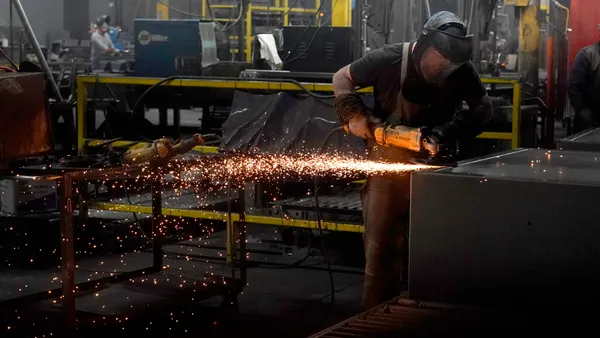Dive Brief:
- Delaware's job training program focused on manufacturing saw 33% growth in expected completion rates, and that statistic is expected to continue to rise, according to a release by the Delaware Prosperity Partnership, a public-private partnership to manage economic development for the state. The state's Pathways to Prosperity program is a direct response to growing manufacturing interest in the area.
- The program includes training and degree opportunities that start in high school and continue through regional universities and colleges, including Delaware Technical Community College. Adults can also upskill through the program to move ahead in their career journey.
- Half of the companies looking to move into or expand in Delaware will be in the manufacturing sector, the release noted. Manufacturers are one of the state's largest employers, accounting for 5.6% of Delaware's total employment and 6.7% of the larger region.
Dive Insight:
The struggle to fill jobs in advanced manufacturing continues thanks to vast skills shortages prompted by the rise of new tech and the incoming retirement of much of the industry's employee base. A study by SCORE showed that 90% of manufacturing companies cannot fill all available jobs. Even as new plants and training facilities open, the gap continues to trouble employers in the sector.
For this reason, trade associations have doubled down on training, starting with high schoolers in an attempt to paint a more realistic picture of careers in the manufacturing sector. The National Association of Manufacturers has pledged to train 1 million workers over the next five years to fill need. Companies that perform highly skilled manufacturing are also taking training into their own hands, building high tech facilities to train workers up faster and more effectively.
The good news is that younger workers, Gen Z in particular, hold a more favorable view of working in the manufacturing sector, according to a recent survey by Leading2Lean. Data suggests they're more likely than the general population to consider working in the field due in part to having family members in the field or teachers being more willing to bring up manufacturing as a potential path. Contingent workers also favor the sector because of its higher wages and opportunities for growth.











